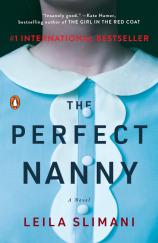The Perfect Nanny
Review
The Perfect Nanny
Your home is not safe.
Your children are in danger.
It’s hard to think of a sentence more upsetting than those two.
Well, try this: “The baby is dead.”
That’s the first sentence of THE PERFECT NANNY, a just-published novel by Leila Slimani. Here’s the rest of the first paragraph:
The baby is dead. It took only a few seconds. The doctor said he didn’t suffer. The broken body, surrounded by toys, was put inside a grey bag, which they zipped shut. The little girl was still alive when the ambulance arrived. She’d fought like a wild animal. On the way to the hospital, she was agitated, her body shaken by convulsions. Eyes bulging, she seemed to be gasping for air. Her throat was filled with blood. Her lungs had been punctured, her head smashed violently against the blue chest of drawers.
Makes you queasy? This ruthless opening is supposed to. And it’s supposed to hook you into reading more. I know. THE PERFECT NANNY was, for me, as it will be for many, a 228-page non-stop guilty pleasure. With a literary consolation: Leila Slimani is the first Moroccan woman to win the Prix Goncourt. Her novel has been published in 18 languages and will soon be published in 15 more. She is Emmanuel Macron’s personal representative for the promotion of the French language and culture. No surprise, then, that THE PERFECT NANNY received the big book write-up in The New Yorker and that it’s been published here in paperback and sold by Amazon for $11, so it can be snapped up by readers who devoured GONE GIRL. [To buy the paperback from Amazon, click here. For the Kindle edition, click here.]
"THE PERFECT NANNY was, for me, as it will be for many, a 228-page non-stop guilty pleasure.... Why read a thriller that gives the climax away at the start? Because it isn’t that kind of thriller. Its real subject isn’t who and how, but why --- it’s about culture and class, the hottest topics of the day."
Why read a thriller that gives the climax away at the start? Because it isn’t that kind of thriller. Its real subject isn’t who and how, but why --- it’s about culture and class, the hottest topics of the day. “Usually, the Goncourt Academy rewards books of the past,” the president of the jury explained. “This year, we elect a book that speaks of the present, of the everyday and of its problems, such as the question of delegating authority and love to a person outside the family. Many will recognize themselves in this book.”
Is this you? Anyone you know? Paul and Myriam have two young children, Mila and Adam. They live in the trending Tenth Arrondissement, but in a small apartment. That’s because his career as a music mogul is slow to start. And she abandoned her career as a lawyer to be a full-time mother. Now she feels it’s time for her to reclaim her personhood --- you know, go back to work. That calls for a nanny.
Paul and Myriam carve out a Saturday afternoon for interviews. He has strong views about the women they’ll meet: “no illegal immigrants…not too old, no veils, and no smokers.” They hire Louise, a quiet woman who wears a blouse with a Peter Pan collar. She’s “a miracle worker” who not only cares for the kids, but cleans the apartment and cooks gourmet meals for the dinner parties that Paul and Myriam start to host. You know what’s next:
Myriam lets herself be mothered. Every day she abandons more tasks to a grateful Louise. The nanny is like those figures at the back of a theater stage who move the sets around in darkness. She picks up a couch, pushes a cardboard column or a wall with one hand… She is Vishnu, the nurturing divinity, jealous and protective; the she-wolf at whose breast they drink, the infallible source of their family happiness.
And then it all goes wrong.
There’s something else wrong here, and I think it’s moral. In 2012, as the New York Times reported, “A horrified mother walked into her Upper West Side apartment on Thursday to see the family’s nanny stabbing herself with the same bloody kitchen knife that she had already used on two of the woman’s young children, who lay dead in a bathtub.”
It’s one thing to write a book “inspired by true events.” But THE PERFECT NANNY goes well beyond that. As Jean-Marie Simon writes on Amazon, THE PERFECT NANNY does not even stop at channeling the murder: it describes a police officer who is charged with giving the awful news to the father as he returns from a trip, at a train station in Paris; Mr. Krim, a television executive returning from a West Coast business trip, was met at the airport with the same news. Even in the lead in to the murders, the author cannot resist cribbing from The New York Times’ background pieces on the Krim murder: in the book, the couple take their perfect babysitter on vacation with them to Greece; the Krims vacationed in the Dominican Republic in order to bond further with their homicidal nanny.
I can’t imagine that the parents of a dead two-year-old boy and a six-year-old girl in New York will be reading this book. Knowing what I now do about it, I find THE PERFECT NANNY just a bit creepier than I did when I was inhaling it. I admire the novel’s chilly brilliance. I’m slightly jealous of its success. My reservation is moral. Leila Slimani has two children. As critics point out, this gives her empathy and insight. Yes, it does. But only to a point.
Reviewed by Jesse Kornbluth for HeadButler.com on January 19, 2018
The Perfect Nanny
- Publication Date: January 9, 2018
- Genres: Fiction, Psychological Suspense, Psychological Thriller, Suspense, Thriller
- Paperback: 240 pages
- Publisher: Penguin Books
- ISBN-10: 0143132172
- ISBN-13: 9780143132172




